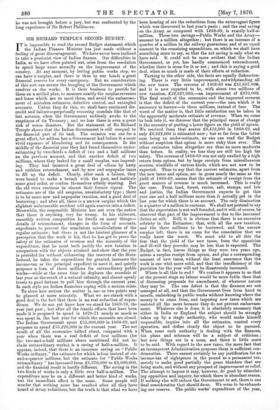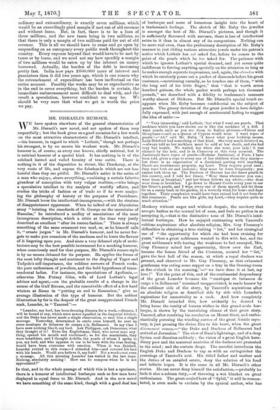SIR RICHARD TEMPLE'S SECOND BUDGET.
IT is impossible to read the second Budget statement which the Indian Finance Minister has just made without a feeling of great discouragement. We have never been inclined to take a pessimist view of Indian finance. Our difficulties in India, as we have often pointed out, arise from the resolution to spend large sums annually on the improvement of the country. At any moment, by letting public works stop, we can have a surplus, and there is thus to our hands a great financial reserve for every emergency. But no consideration of this sort can excuse the bungling of the Government which resolves on the works. It is their business to provide for them on a settled plan, to measure exactly the surplus revenues and loans which are to meet them, and avoid the embarrass- ment of mistaken estimates, defective control, and entangled accounts. Unless they do this, we shall have continued dis- credit and failure—perpetually recurring scandals like that of last autumn, when the Government suddenly awoke to the emptiness of its Treasury ; and we fear there is even a great risk of worse disasters. But the statement of Sir Richard Temple shows that the Indian Government is still unequal to the financial part of its task. The occasion was one for a great effort, for seldom has a Government had before it a more vivid exposure of blundering and its consequences. In the middle of the financial year they had found themselves under- estimating by two-thirds a deficit of two and a half millions on the previous account, and that another deficit of two millions, where they looked for a small surplus, was impend- ing. They had incurred a great deal of odium by hasty and ruthless retrenchment, and by new and unpopular taxes to fill up the deficit. Clearly, after such a failure, they were bound to make a breach with the past, and institute some good order, or confess themselves utterly wanting. But the old vices continue in almost their former vigour. The estimates are of the old sanguine, unsatisfactory type ; there is to be more new and unpopular taxation, and a good deal of borrowing ; and after all, there is a narrow surplus which the slightest unfavourable accident will again convert into a deficit. Meanwhile, the responsible Minister has not even the notion that there is anything very far wrong. In his elaborate, smoothly written composition he dwells on many things— details of retrenchment, changes in the form of accounts, expedients to prevent the scandalous miscalculations of the regular estimate ; but there is not the faintest glimmer of a perception that the work is his, that he has got to prove the safety of the estimates of revenue and the necessity of the expenditure, that he must both justify the new taxation in comparison with the objects attained and show that the year is provided for without exhausting the reserves of the State. Instead, he takes the expenditure for granted, increases the income-tax as the principal expedient to meet it, and quietly proposes a loan of three millions for extraordinary public works—while at the same time he deplores the scandals of last year as the result of a natural calamity, and almost openly trusts to good fortune to pull him through the current year. In such style are Indian financiers coping with a serious crisis.
To show how serious the matter is, one or two points may be glanced at more minutely. What we are struck with a good deal is the fact that there is no real reduction of expen- diture. We do not yet know how we stand for 1869-70, the year just past ; but after all the frantic efforts that have been made it is proposed to spend in 1870-71 nearly as much as was spent in the last year for which the accounts are closed. The Indian Government spent £55,800,000 in 1868-69, and proposes to spend £55,226,000 in the current year. The net result of all the economies talked about, compared with a year when there was a real deficit of four millions (for the two-and-a-half millions above mentioned did not in- clude extraordinary works), is a saving of half-a-million. It appears, indeed, that there is an immense saving on "Public Works ordinary," the estimate for which is four instead of six- and-a-quarter millions, but the estimate for "Public Works extraordinary" has increased from £1,370,000 to £3,000,000, and the financial result is hardly different. The saving in the two kinds of works is only a little over half-a-million. The expenditure may be on a different and better kind of works, but the immediate effect is the same. Some people will wonder that nothing more has resulted after all they have heard of Army reductions, but the truth is that what we have been hearing of are the reductions from the extravagant figure which was discovered in last year's panic ; and the real saving on the Army, as compared with 1868-69, is exactly half-a- million. These two savings—Public Works and the Army— amount to a million altogether ; but there is an increase of a quarter of a million in the railway guarantees, and of an equal amount in the remaining expenditure, on which we shall have something more to say, so that the net saving is only what we have said. It could not be more evident that the Indian Government, as yet, has hardly commenced retrenchment, whether there is room for it or not ; and this is saying a good deal, when so much is made of their efforts at reduction.
Turning to the other side, the facts are equally dishearten- ing. There is very little improvement, notwithstanding all the new taxes. The revenue of 1868-69 was £51,657,009, and it is now expected to be, with about two millions of new taxation, £52,327,000,—an improvement of £670,000. The final result of the economies and the improved revenue is that the deficit of the current year—the sum which it is necessary to borrow—is three millions, instead of four. The worst of the matter is, that little satisfaction can be taken in the apparently moderate estimate of revenue. When we come to look into it, we discover that the principal cause of change is the necessity of putting a kower figure on the yield of opium. We received from that source £8,453,000 in 1868-69, and only £6,922,000 is estimated now ; but so far from the latter sum being an under-estimate, no one can read the Budget without suspicion that opium is more risky than ever. The. other estimates taken altogether are thus no more moderate than before. In reality, we fear they are still too high for safety. The revenue of 1868-69 was not only swelled by a high return from opium, but by large receipts from miscellaneous sources, windfalls of various kinds, which are not now to be expected. Thus to say that the current estimates, apart from the new taxes and opium, are in gross nearly the same as the yield of 1868-69, means that the estimate of receipt from the great sources of revenue is much increased. This is really the case. From land, forest, excise, salt, stamps, and law and justice, the Indian Government expects to get this year one and a half millions more than it actually got in the last year for which there is an account. The only diminution is a quarter of a million in customs. We shall not pretend to say that the expectation is not well founded, and it will, of course, be observed that part of the improvement is due to the increased duties on salt. Still, it is obvious that there is no excessive sobriety in the Estimates ; that, with all the new taxation, and the three millions to be borrowed, and the narrow surplus left, there is no room for the consolation that we really know the worst. We must add to all this the fear that the yield of the new taxes, from the opposition and they provoke, may be less than is expected. The Budget, in fact, leaves things as they were two years ago, minus a surplus receipt from opium, and plus a corresponding amount of new taxes, without the least assurance that the work is one whit more solid, and that the insufficiency of the provision for the year will not be disastrously increased.
Where is all this to end ? We confess it appears to us that at the present stage no labour would be more futile than that of discussing proposals for amendment, of whatever nature they may be. The one defect is that the finances are not managed at all, and that the Government lives from hand to mouth, embarking in public works without knowing where the money is to come from, and imposing new taxes which are resisted all the more because they do not prevent embarrass- ment. Whatever else is done, it is absolutely necessary that either in India or England the subject should be strongly taken up by a single authority, who would make himself responsible, inquire into all the estimates, control every operation, and define clearly the object to be pursued. When some such authority is dealing with the finances, his plans and schemes will be a subject of criticism ; but now things are in a mess, and there is little more to be said. With regard to the new taxes, the mere fact that an incompetent Administration proposes them is sufficient con- demnation. There cannot certainly be any justification for an income-tax of eightpence in the pound as a permanent tax, merely to make good partially the gross blunders that are being made, and without any prospect of improvement or relief. The attempt to impose it may, however, do good by stimulat- ing opposition and inquiry, for which there is abundant reason. If nothing else will induce the Government to act, there is one final consideration that should do so. We seem to be exhaust- ing our reserve. The public works' expenditure of the year,
ordinary and extraordinary, is exactly seven millions, which would be an exceedingly good margin if met out of old revenue and without loans. But, in fact, there is to be a loan of three millions, and the new taxes bring in two millions, so that there is only a margin of two millions paid for out of old revenue. This is all we should have to come and go upon by suspending on an emergency every public work throughout the country. Every expense beyond that would have to be met by taxes or by loans, and we need not say how speedily a margin of two millions would be eaten up by the interest on money borrowed. Actually, the burden of the debt is increasing pretty fast. India now pays £600,000 more of interest and guarantees than it did two years ago, which is one reason why the retrenchment of expenditure has been ineffectual on the entire account. Possibly the works may be so reproductive as in the end to cover everything, but the burden is certain, the immediate embarrassment most difficult to deal with, and the result a speculation, however confident we may be. We should be very sure that what we get is worth the price we pay.































 Previous page
Previous page